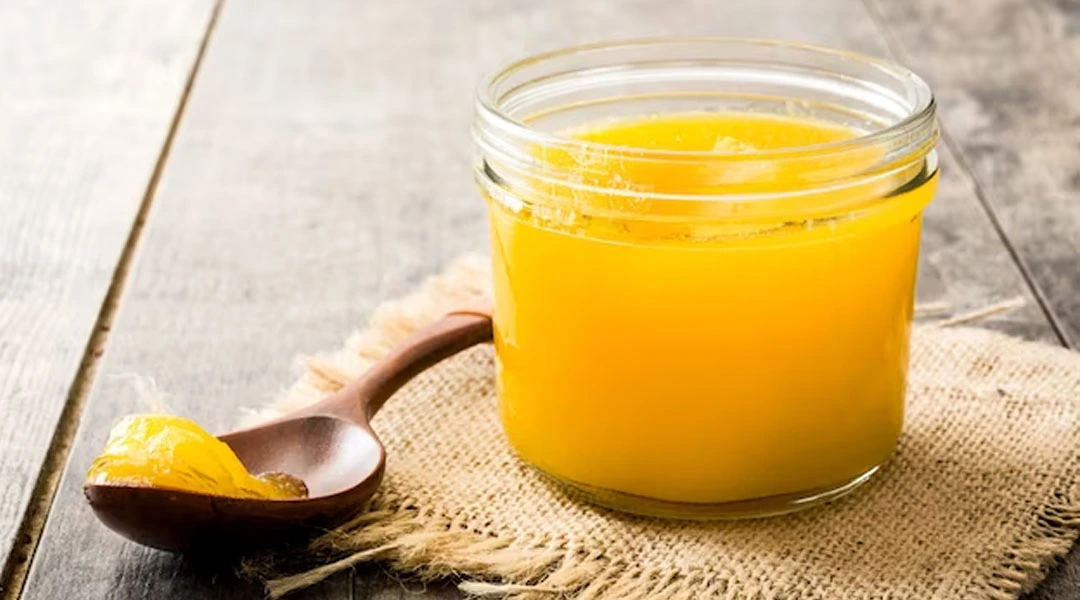In Ayurveda, ghee is regarded as a Sattvic meal. Sattvic meals are meant to be pure and nourishing, and they are thought to improve Dosha balance. That’s why, Yash Birla follows a Sattvic diet.
अय धृतम् दीकन्तिस्मृतिदायकं बलकरं मेधाप्रदं पुष्टिकृद् वातश्लमहहरं श्रीमोपशमनं पित्तपाहं शुद्धिकृत्।
वह्नेर्नभेन्द्रकरं विपाकमधुरं वैश्यं वपुः शरीर्यदं गव्यं हव्यतमं घृतं बहुगुणं सद्यः समावर्तितम्।।
गव्यस्य। (रा.नि.-16.72) (रा.नि.-16.72)
The Guna of Ghritam has been very effectively explained by Ayurveda. There are numerous applications for ghritam, which are referred to as “Nitya Sevniya.”
It enhances Medha, memory, digestive power, and other qualities such as Bala, which is physical strength.
The Doshas are supposed to worsen during the wet season. This is a result of the humid weather, which can cause a rise in Vata and Kapha. The Doshas are considered to be balanced during the rainy season thanks to ghee. Additionally, it is claimed to strengthen immunity, enhance digestion, and shield the body from diseases. Thus, Yash Birla makes sure that his meals include ghee.
Let us look at the
benefits of ghee in the rainy season from an Ayurvedic standpoint
- Ghee can be used as a cooking oil. It works well for roasting, sautéing, and frying veggies.
- Your favourite Indian meals should include ghee. Both a rich flavour and a nutty scent will be added.
- Use ghee to create chilly beverages. Consider putting a spoonful of ghee in your coffee or chai.
- Include ghee in your recipes for sweets. Your pastries will taste rich and luscious thanks to it.
Here are a few unique benefits of ghee in the rainy season according to Ayurveda:
It helps to improve digestion. Even in humid conditions, ghee is simple to digest due to its high smoke point. Ghee is one of the best foods for digestion since it reduces inflammation and lubricates the digestive tract. Eating ghee promotes the development of advantageous bacteria in the gut, which enhances digestion and nutrient absorption. Additionally, it helps to relieve gastrointestinal symptoms like bloating, constipation, and nausea.
It boosts immunity. A healthy immune system depends on vitamin A, which is abundant in ghee. During the monsoon season, the antioxidants in ghee help to strengthen the immune system and ward off colds and the flu. Omega-3 fatty acids, which reduce inflammation, and vitamins A, D, E, and K are also present in ghee. These minerals work together to improve immunity against various diseases.
It hydrates the hair. Ghee has a lot of antioxidants and Omega 3 fatty acids, making it an excellent natural conditioner for dry, unmanageable hair. It strengthens and moisturises the hair’s roots. Many people still have dry, frizzy hair even after spending a fortune on hair treatments. Regular hair conditioning is the only treatment, and ghee is the most natural way to do it. Store-bought conditioners and oils need to be abandoned because they include extra chemicals. Ghee is the best conditioner for hair since it contains the nourishing vitamins D, E, K2, and A.
It takes care of the skin. Ghee moisturises and softens the skin while also preventing acne and pimples, which commonly arise during the humid weather of the rainy season. Essential short-chain fatty acids and fat-soluble vitamins make up its composition. Additionally, she continues, ghee imparts a natural sheen, reduces dark circles, treats dry skin, and aids in lightening black spots.
It enhances brain function. According to some, ghee has a relaxing impact on the mind that can aid in lowering tension and anxiety. Ghee has a high fatty acid content, which is believed to enhance brain function. It supports the growth of cognitive abilities like memory, concentration, focus, and judgement. Omega 3s, a type of essential fatty acid that has been linked to improving mood and mental wellness, are also present in ghee.








Leave A Comment